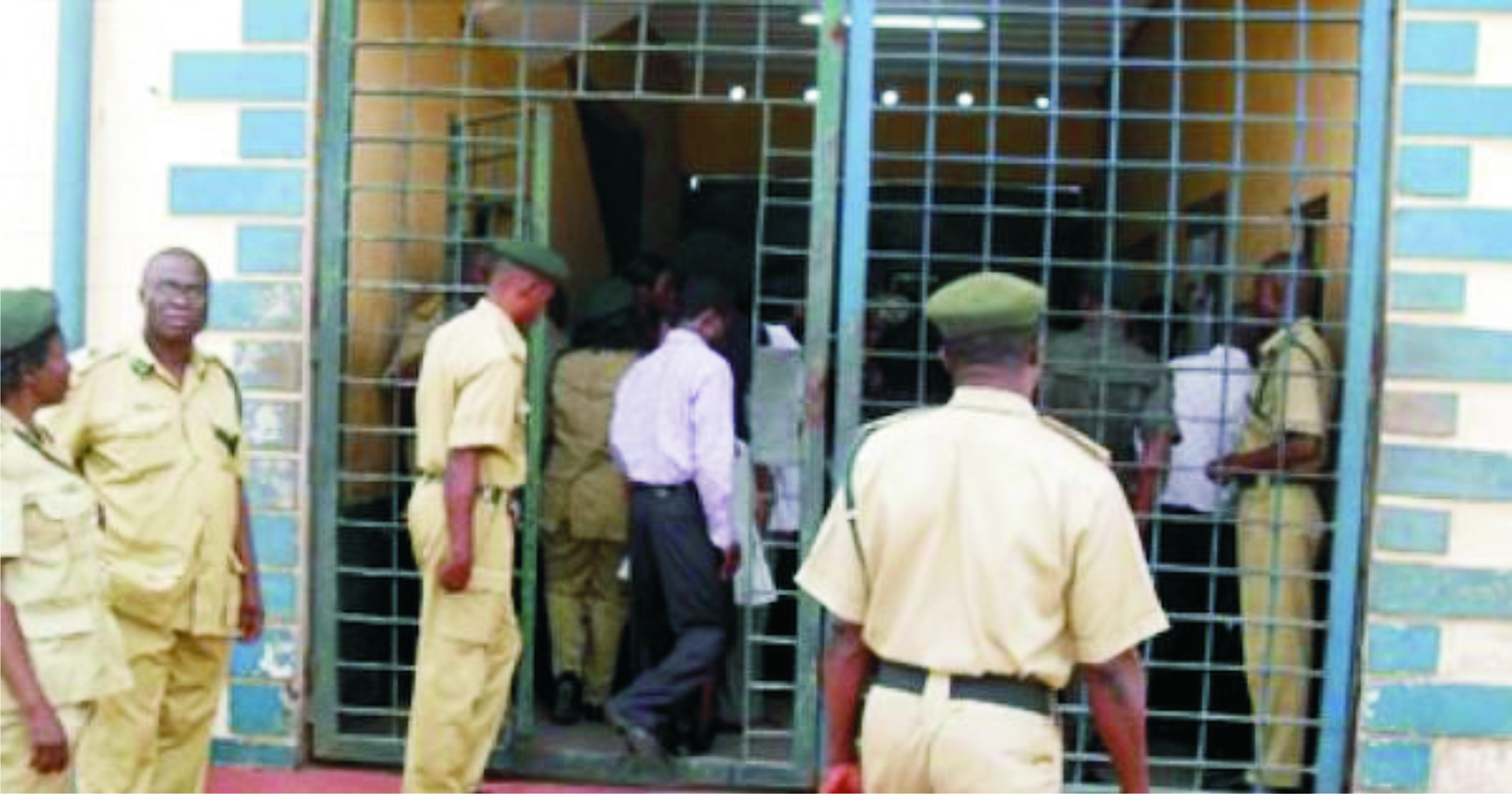Editorial
Tackling The Rot In NCoS

A recent disclosure that more than 3,418 inmates are currently on death row in correctional centres across Nigeria is a cause for alarm. The spokesman for the Nigerian Correctional Service (NCoS), Mr. Abubakar Umar, released this shocking revelation, adding that the total inmate population as of December 18, 2023, stood at 77,849. The stark gender disparity is also worth noting: 76,081 males and 1,768 females. The penal system also appears to be highly saturated with Awaiting Trial Inmates (ATIs) numbering 53,836.
The figures in question call for a need to critically examine and challenge the existing penal policy in Nigeria, especially regarding the death penalty. The state of a nation’s prisons often provides an unadulterated reflection of its society. Critics may argue that it is unequivocally wrong to judge a country by its prisons, citing that this may not paint an accurate picture of national values and development.
However, taking Nigeria as an example, we can convincingly counter such an argument. Judged by the parlous state of its prisons, Nigeria is perceived as a nascent and underdeveloped country with the perpetration of a facsimile of progress. Life in Nigerian prisons can be profoundly challenging. Unlike in some other countries, where prisons aim to rehabilitate offenders, Nigerian prisons often fail to achieve this goal. Instead, inmates are more likely to be influenced by criminal behaviour during their time behind bars, increasing the chances of recidivism after their release.
According to a report published by the Daily Mail of London in 2009, the conditions in Nigerian jails were deemed to be extremely harsh. As a result, Britain made an offer to construct a more humane prison facility in Nigeria, to accommodate approximately 400 Nigerian convicts who had committed crimes within the United Kingdom. This proposal was motivated by the understanding that prisoners facing deportation from the UK could potentially resist being sent back to Nigeria by claiming violations of their human rights.
In Germany, it has been reported that incarcerated individuals experience a certain degree of freedom of movement within their facilities, and are entrusted with the responsibility to make wise choices regarding how they utilise their time. Occasionally, they are granted the opportunity to temporarily leave the prison premises, either for a few hours or overnight, to visit loved ones. However, the situation in Nigeria markedly differs, as the inmates often emerge from their confinement hardly reformed. Upon completing their prison sentences, they appear more dehumanised than dignified.
The revelation of the presence of 3,418 prisoners awaiting execution in correctional facilities throughout Nigeria is disconcerting. This statistic indicates a disregard for the inherent worth of human dignity, and highlights systemic dysfunction within the criminal justice system. Following the conviction and imposition of death penalties, the state governors, who bear the duty to authorise death warrants, must cease evading their constitutional obligation, and instead, aid in alleviating the overcrowding in custodial centres.
Typically, the task is challenging. In contrast to autocracies, leaders in numerous democracies exhibit hesitancy towards implementing the death penalty. Debates regarding its ethical nature, efficacy, and equity are prevalent globally. Amnesty International reports that 112 countries have abolished the death penalty either legally or in practice. On the other hand, 55 countries, such as Nigeria, maintain the death penalty for severe crimes in their legal codes.
Unfortunately, state governors find themselves in a state of conflict because of the decisions they have to make. However, the choice they need to make is evident. Like the president, governors are empowered by the Constitution to exercise their discretion in matters of mercy. This includes the ability to reduce death sentences to imprisonment, release individuals who are on death row, or grant them full pardon. On the other hand, they also have the option to approve the death warrants, particularly those who have exhausted all avenues for appeal and have had their sentences confirmed by the Supreme Court.
A joint effort by the federal legislature and the executive branch to revamp Nigeria’s inadequate prisons appears to be in danger of failing. The proposal to restructure the prisons became tangible when former President Muhammadu Buhari approved the Nigerian Correctional Service Bill. The bill, which had been neglected by the National Assembly for several years before its passage, altered the previous name of the Nigerian Prisons Service to the Nigerian Correctional Service. However, certain aspects of the new law are already falling behind the rapidly changing circumstances in society.
Thus far, the alteration of the name is merely superficial, as the prisons have not yet experienced any critical transformation. For many years, these facilities have been unsightly, completely contradicting their initial purpose. Following inadequate funding, deplorable nourishment, and a lack of expansion efforts, overcrowding has become an unfortunately well-known issue. In Lagos, the five federal prisons, originally designed to house 4,087 inmates, currently hold 9,044 inmates as of March, a predicament shared by all other prisons in the nation.
A profound paradigm shift occurred with the last constitutional amendment in Nigeria, eliciting an extraordinary transformation in the landscape of the nation’s correctional system. This shift lies in the devolution of prison ownership and management, transferring the power from the Federal Government to the States. While this may seem a logistical or even a trifle bureaucratic change to an uninformed observer, those knowledgeable about Nigeria’s prison system understand its potential impact on a long-standing problem: prison congestion.
Governors should utilise the excellent opportunity to experiment with various models of correctional facilities.
President Bola Tinubu, and Interior Minister, Olubunmi Tunji-Ojo, should prioritise the issue of prison decongestion. It is important to note that despite previous promises made by officials, little progress has been achieved. Tunji-Ojo’s recent commitment to releasing 4,000 inmates is a positive step forward.
It is, indeed, crucial to reactivate the mercy machinery and conduct thorough reviews to assess options for clemency, such as reducing sentences. The huge population of awaiting trial prisoners is a disgrace, and state governors and state chief judges must approach this task with resolve and seriousness. It clearly paints a picture of a failed justice administration system, which must be immediately addressed from the law enforcement agencies, especially police, to the judicial officers. A situation where almost 70percent of the inmate population are ATIs is unacceptable. The time to act is now!
Editorial
Democracy Day: So Far…

Nigeria’s return to democratic rule in 1999 marked a watershed moment in the nation’s political history. After enduring nearly 16 years of successive military dictatorships, Nigerians embraced a new era of civil governance with the inauguration of President Olusegun Obasanjo on May 29, 1999. Since then, the country has sustained a democratic system for 26 years. But, this democratic journey has been a complex mix of progress and persistent challenges.
The formal recognition of June 12 as Democracy Day in 2018 by former President Muhammadu Buhari acknowledged a long-standing injustice. The annulment of the 1993 presidential election, Nigeria’s freest, betrayed the democratic aspirations of millions. That it took decades to honour this date reflects the nation’s complex relationship with its democratic memory.
One of the most momentous successes of Nigeria’s democracy has been the uninterrupted civilian rule over the last two and a half decades. The country has witnessed seven general elections, with power transferring peacefully among different political parties. This is particularly notable considering that prior to 1999, no civilian government had completed a full term without military intervention. The peaceful transitions in 2007, 2015, and 2023 are testaments to Nigeria’s evolving democratic maturity.
Electoral participation, while uneven, has also reflected a level of democratic engagement. In 2003, voter turnout stood at about 69 per cent, but this figure dropped to approximately 34.75 per cent in 2023, according to the Independent National Electoral Commission (INEC). Although the declining turnout raises concerns, it also highlights the increasing expectations of the electorate, who demand credible and transparent elections.
Another area of progress is the growth of a vibrant and free press. Nigerian media has played a crucial role in holding governments accountable and fostering public discourse. Investigative journalism and civil society activism have exposed corruption and human rights abuses. The rise of social media has further expanded the democratic space, enabling young Nigerians to mobilise and advocate for change, as evidenced by the 2020 #EndSARS protests.
Judicial independence has seen mixed results. On one hand, the judiciary has occasionally demonstrated resilience, such as in landmark rulings that overturned fraudulent elections or curtailed executive excesses. On the other hand, allegations of political interference and corruption within the judiciary persist, undermining public confidence in the legal system’s impartiality.
Nigeria’s democracy has also facilitated the decentralisation of power through the federal system. State governments now wield some autonomy, allowing for experimentation in governance and service delivery. While this has led to innovative policies in some states, it has also entrenched patronage networks and uneven development across the federation.
Despite these successes, Nigeria’s democratic journey faces formidable problems. Electoral integrity remains a critical concern. Reports from election observers, including those from the European Union and ECOWAS, frequently highlight issues such as vote-buying, ballot box snatching, and violence. The introduction of the Bimodal Voter Accreditation System (BVAS) and electronic transmission of results in 2023 elections showed promise, but technical glitches and alleged manipulations dampened public trust.
Corruption continues to be a pervasive issue. Nigeria ranks 145th out of 180 countries on Transparency International’s 2023 Corruption Perceptions Index, with a score of 25/100. Democratic institutions meant to check graft—such as anti-corruption agencies and the legislature—often struggle due to political interference and weak enforcement mechanisms.
Security challenges have also strained Nigeria’s democracy. Insurgency in the North East, banditry in the North West, separatist agitations in the South East, and herder-farmer conflicts across the Middle Belt have collectively resulted in thousands of deaths and displacements. According to the Global Terrorism Index 2024, Nigeria ranks as the eighth most impacted country by terrorism. The government’s difficulty in ensuring safety erodes public confidence in the state’s capacity and legitimacy.
The economy poses another critical remonstrance. Nigeria’s Gross Domestic Product (GDP) per capita stands at approximately $2,400 as of 2024, with over 40 per cent of the population living below the national poverty line. High unemployment and inflation have fueled discontent and disillusionment with democratic governance, especially among youth. Without addressing economic grievances, the democratic dividend will remain elusive for many Nigerians.
Ethnic and religious divisions further complicate Nigeria’s democratic consolidation. Politicians often exploit identity politics for electoral gains, exacerbating social tensions. Although federal character principles aim to promote inclusiveness, they have also sometimes fostered a quota mentality rather than merit-based appointments.
Gender representation remains inadequate in Nigeria’s democratic institutions. Women occupy less than 10 per cent of seats in the National Assembly, one of the lowest rates globally. Efforts to pass gender parity bills have faced stiff resistance, highlighting deep-seated cultural and institutional barriers to female political participation.
Civil liberties, while constitutionally guaranteed, are under threat. Crackdowns on protesters, restrictions on press freedom, and surveillance of activists reveal an authoritarian streak within the democratic framework. The controversial Twitter ban in 2021 exemplified the country’s willingness to curb digital freedoms, prompting domestic and international criticism.
The political crisis in Rivers State embodies broader democratic struggles. Attempts to control the state through undemocratic means expose weaknesses in federal institutions and the rule of law. Immediate restoration of democratic governance in Rivers State is vital to preserving Nigeria’s democratic integrity and institutional credibility.
Local governments remain under the control of state governors, depriving citizens of grassroots democracy. Last year’s Supreme Court judgment on local government autonomy is promising, but state-level resistance threatens its implementation. Genuine autonomy would bring governance closer to the people and foster democratic innovation.
As we mark Democracy Day, we must honour the sacrifices of Chief M.K.O. Abiola, Kudirat Abiola, Femi Falana, Chief Gani Fawehinmi, Pa Alfred Rewane, President Bola Tinubu, and countless others, who fought for Nigeria’s freedom. As democracy in Nigeria continues to evolve after 26 years, this day should inspire action toward its renewal. With despotism and state failure as real threats, both citizens and leaders must take responsibility—citizens by demanding more, and leaders by delivering. Excuses are no longer acceptable.
Editorial
Nigeria’s Plastic Pollution Emergency

Yesterday, Nigeria joined the rest of the world to mark 2025 World Environment Day. The occasion serves as a stark reminder that our battle against plastic pollution requires more than symbolic gestures—it demands sustained, coordinated action from all levels of government. As communities worldwide grapple with mounting environmental challenges, Nigeria’s approach to plastic waste management stands at a critical juncture.
Dr. Ibinabo Ogolo, a Research Fellow at the Institute of Geosciences and Environmental Management at Rivers State University, has issued a timely call for comprehensive enlightenment campaigns targeting indiscriminate plastic waste disposal. Her message resonates with the urgency that characterises this year’s global theme: “Beat Plastic Pollution.”
The core challenge lies not in policy formulation but in implementation. Years of environmental initiatives have fallen short primarily due to inadequate public education and awareness campaigns. Citizens cannot be expected to adopt responsible waste disposal practices without understanding the gravity of their actions or knowing the proper alternatives.
Government platforms at federal, state, and local levels possess the infrastructure necessary to reach every corner of our society. Television, radio, social media, community meetings, and educational institutions provide ready channels for sustained messaging. The tools exist; what remains is the political will to deploy them effectively and consistently.
This year’s World Environment Day theme underscores the global recognition of plastic pollution’s devastating impact on ecosystems, wildlife, and human health. The message is clear: plastic waste represents one of the most pressing environmental challenges of our time, requiring immediate and sustained attention from policymakers and citizens alike.
The health implications of plastic pollution extend far beyond environmental aesthetics. Industrial and medical plastic wastes often contain toxic chemicals with carcinogenic properties, posing direct threats to human health. These materials don’t simply disappear when improperly disposed of-they infiltrate our environment, contaminating soil, water sources, and food chains.
Plastic additives released into the environment create a cascade of contamination that affects entire ecosystems. Wildlife suffers through ingestion, entanglement, and habitat destruction, while humans face exposure through contaminated water, food, and air. The interconnected nature of these impacts demands a comprehensive response that addresses both immediate disposal practices and long-term prevention strategies.
The link between plastic pollution and serious health conditions, including breast, ovarian, liver, and lung cancers, as well as various hormonal disorders, underscores the urgency of public education campaigns. Citizens have the right to understand how their daily choices affect not only environmental health but their own well-being and that of their families.
Despite scientific awareness of ocean plastic pollution dating back approximately 50 years, Nigeria’s rivers, creeks, and waterways continue to suffer from plastic waste invasion. This represents a failure of sustained commitment rather than a lack of knowledge about the problem’s existence and solutions.
The ritualistic approach to World Environment Day celebrations must end. Annual speeches and symbolic cleanups, while valuable, cannot substitute for year-round, systematic efforts to change behaviour and protect our environment. Governments must develop comprehensive frameworks that extend beyond June 5th commemorations.
Sustained enlightenment campaigns require dedicated funding, clear messaging, measurable objectives, and regular evaluation. Success depends on consistency, creativity, and community engagement that transforms environmental protection from a government mandate into a shared cultural value.
The path forward demands that all stakeholders-government officials, community leaders, educators, and citizens-recognize their roles in combating plastic pollution. Only through sustained, coordinated efforts can we hope to achieve the behavioural changes necessary to protect our environment and secure a healthier future for generations to come.
Editorial
2025 UTME: Lessons, Concerns

The recent uproar surrounding the poor performance of students in the 2025 Unified Tertiary Matriculation Examination (UTME), alongside growing distrust in the Joint Admissions and Matriculation Board (JAMB), has sparked nationwide concern and regional tensions.
JAMB’s published results reveal a troubling trend: over 75 per cent of candidates scored below 200 out of 400. This marks a continuation of a steady decline in performance since 2020. The Minister of Education, Prof. Tunji Alausa, attributed this decline largely to the shift toward the Computer-Based Test (CBT) format introduced by JAMB.
Yet the crisis extends beyond widespread low scores. A total of 379,997 candidates-primarily from South-East Nigeria and Lagos State-were reportedly affected by technical glitches and human errors. These issues rendered their results invalid. In a rare public admission, JAMB Registrar, Professor Ishaq Oloyede, broke down in tears at a press conference, accepted responsibility, and announced a makeup UTME scheduled from Friday, May 16 to Monday, May 19, 2025.
However, the decision to reschedule the exam on short notice has drawn criticism. Many argue that the affected candidates, already emotionally distressed, were not given sufficient time to prepare. The Board’s plan to inform them via bulk SMS-a method known for its 50-60 per cent delivery rate-was also seen as inadequate, potentially excluding half of those impacted. Critics argue, JAMB should have either extended the resit period or leveraged digital answer scripts for regrading-unless, of course, such retrieval technology is unavailable.
Multiple factors likely contribute to the consistent underperformance of UTME candidates, yet the nation has seemingly accepted this dismal trend as standard. Each year, JAMB meets with university vice-chancellors, and low results are normalised. Consequently, universities scramble to admit the 25 per cent who scored above 200, often lowering their standards to fill quotas. This is especially evident in the profit-driven expansion of private universities.
The 2025 UTME debacle has exposed long-standing systemic flaws. Embracing digital-only exams demands greater readiness-both from service providers and from candidates. Reports from CBT centres include system malfunctions, frozen screens, login errors, and lost answers. Some candidates were unable to navigate subjects or submit their tests. These failures were beyond their control.
Whether due to technical incompetence or deliberate sabotage, the damage is clear. Some speculate that JAMB or its leadership-particularly Prof. Oloyede-may have been targeted. Over the past nine years, Oloyede has returned billions of naira in surpluses to the national treasury, earning both praise and scrutiny. While JAMB is not a revenue-generating agency, this unusual financial transparency has boosted its public image.
Despite this crisis, Prof. Oloyede showed commendable leadership, accepting responsibility, and taking immediate corrective action. The priority now must be to implement lasting solutions that prevent future failures. Leadership must be both principled and responsive to the public outcry.
Beyond the technical breakdowns and poor performance statistics, the UTME crisis had a tragic human cost, with at least one student reportedly taking their own life. Widespread irregularities have undermined trust in Nigeria’s educational meritocracy, reducing years of student effort to nothing.
The use of flawed software systems lacking safeguards has had catastrophic consequences. Essential reforms must include external audits, system redundancies, and real-time monitoring. JAMB’s initial poor communication only deepened public anxiety, underlining the need for greater transparency and independent oversight.
What is required now is a complete overhaul of JAMB’s technical infrastructure and a new communication strategy grounded in empathy and student welfare. Broader systemic reforms must follow, including more inclusive admission criteria and better support structures for students.
This crisis presents an opportunity-a solemn one-for sweeping reforms that centre students’ needs. Transformative action must be taken, not just in response to this scandal, but in honour of the life lost and to restore public trust.
Finally, an urgent and impartial investigation must uncover the true causes of these failures. Those found culpable must be held accountable. If we move forward without consequences, both JAMB’s reputation and that of its leadership may suffer irreparable damage.
-
Rivers5 days ago
Rivers SOLAD Urges Traditional Rulers To Protect Govt Facilities
-

 Sports5 days ago
Sports5 days agoIkpeba Football Challenge Final Holds,’Morrow
-
Business5 days ago
Petrol Price Should Reflect Sliding Exchange Rate – IPMAN
-

 City Crime5 days ago
City Crime5 days agoDemocracy Day: Tinubu Addresses Joint N’Assembly Today
-
Nation5 days ago
Court Jails Man For N360m Fraud
-

 News5 days ago
News5 days agoSenate Moves To Institutionalise June 12 Presidential Address
-
Rivers5 days ago
Normalcy Returns In Ekpeye Kingdom After Protest
-

 Sports5 days ago
Sports5 days agoOkpekpe 10km Road Race Returns Next Year

